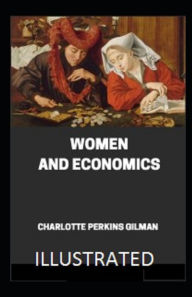Women and Economics Illustrated Charlotte
by Perkins Gilman
2020-05-27 16:47:11
Women and Economics Illustrated Charlotte
by Perkins Gilman
2020-05-27 16:47:11
Centrally, Gilman argues that women must change their cultural identities. Early on, she mentions that humans are the only species in which the female has to depend on the male for survival. This dependence requires women to pay off their debt throug...
Read more
Centrally, Gilman argues that women must change their cultural identities. Early on, she mentions that humans are the only species in which the female has to depend on the male for survival. This dependence requires women to pay off their debt through domestic services, or sex-functions.[4] Gilman argues that women work longer and harder than most men, and not solely in maternal duties.[5] Further, Gilman states that female activities in general are directed by men. These sexual distinctions have led to an odd distribution of power and have been detrimental to both genders, in Gilman's view.These sexual distinctions have left women behind and allowed men to claim credit for human progress. Gilman argues that women fulfill the dual roles of mother and martyr, and pass these roles down to their children, creating a continuing image of women as unpaid workers and nurturers. This in turn, has stunted women's creative and personal growth.Gilman was a confirmed suffragist, but did not believe progress would happen if women were only given the vote. Progress was not measured only by states that allowed women to vote, but as well in the changes legal, social, mental and physical, which mark the advance of the mother of the world toward her full place.[6]Gilman also reflects on the strange fact that poorer women who can least afford it, have more children, while wealthy women who can afford it, have fewer children. Gilman talks about the agricultural age, when more children were needed to assist with farming. In the industrial age however, more children result in more work for the mother. Gilman argued all these points, but still believed motherhood was the common duty and the common glory of womanhood, and women would choose professions compatible with motherhood.[7]Along with being nurturers, Gilman argues that women are also required to be educators. There is no proof in Gilman's opinion however, that women who sacrifice to be nurturers and educators will produce better children. Gilman believes that others can assist with these tasks or even do them more effectively. Gilman was one of the first to propose the professionalization of housework, encouraging women to hire housekeepers and cooks to release them from housework. Gilman envisioned kitchenless houses and designed cooperative kitchens in city apartment buildings which would further help women balance work and family and provide some social support for wives who were still homebound. This would allow women to participate in the workforce and lead a more worldly life. Gilman believed that women could desire home and family life, but should not have to retain complete responsibility of these areas. Gilman stated that these changes would eventually result in better motherhood and fatherhood, better babyhood and childhood, better food, better homes, better society.[8]
Less






























